It is no secret that orangutans are threatened with extinction because their rain forests are being destroyed at an alarming rate. Ten years ago, Shawn Thompson, a writer, former journalist and university professor, set out to chronicle the threat to orangutans in a book released in March 2010. The book is called The Intimate Ape: Orangutans and the Secret Life of a Vanishing Species. The book spends most of the time talking about the nature of orangutans and the relationships between orangutans and people. But the ultimate underlying message is there about the source of the peril to orangutans and the solution. Thompson says that the problem of saving orangutans has to do with communications and human nature.
AN INTERVIEW WITH SHAWN THOMPSON
Mongabay: Why do you say the problem has to do with communications and human nature?

|
Shawn Thompson: We already have more than enough information to know what the problem is and how to save orangutans. But the information stays locked within a relatively small group, mainly scientists and environmentalists, who are a kind of small subculture on the planet. This group tries to communicate by being very sensible and rational, but the message doesn’t get across. The general population doesn’t realize what orangutans are and that they are much closer to extinction than gorillas and chimpanzees. The scientists and environmentalists communicate how they know best, in a sensible and rational way, as though they are talking to their own subculture. But they are talking across cultural lines to a mass audience, which listens and behaves in a different way. So I wrote the book to try and break through that. I went back to basic issues that move a popular mass audience and tried to write a book that would appeal to hearts and minds, to have people fall in love with orangutans, which then becomes the “reason” for saving orangutans, the incentive. We need to feel that orangutans are part of our family. And, of course, in terms of evolution and genetics they are.
Mongabay: Where does human nature come in?
 Shawn Thompson. |
Shawn Thompson:
It will be hard to save orangutan because it goes against the nature of how a large group of people behaves. We are not talking about individuals, but mass behaviour. That is something I understand from my years as a journalist. The mass of people don’t think about orangutans and the rain forest when they are trying to save money in a grocery store or buy a piece of furniture or fight a war or get married and raise children, all of which is part of our biological programming. You can change individual behaviour, but changing mass behaviour is very radical and you need to make deep rooted changes to do that. It can’t be superficial.
Another aspect of human nature, sad to say, is how fragmented scientists and environmentalists are. They fight among themselves and lose sight of the big picture. I saw that a lot writing my book and I see that in the university where I work. People behave too much like chimpanzees. It would be a better world if people behaved more like orangutans. I am joking, of course, but only partly. There is some truth in the jest.
Mongabay: So how do we save orangutans?
Shawn Thompson: To save orangutans, you have to save the rain forest. As the rain forest goes, so go orangutans. That’s my mantra. Save our kindred, save our primate family and you save everything else. The scientists and the environmentalists know that. The habitat of orangutans is being destroyed in Borneo and Sumatra by the palm oil plantations primarily, and also by logging for timber and pulp and paper. That message is clear and simple. Spending a lot more words on that is obviously not having a strong enough effect, although that’s not a reason for not continuing to promote the message. Recently Unilever, the giant producer of consumer goods and the world’s biggest buyer of palm oil, announced that it would stop buying palm oil from a supplier exposed in a BBC documentary. The supplier was collecting palm oil used for Unilever soap and margarine. So we can all feel a little leaner and cleaner over that. And we want to use positive reinforcement and support the ethical companies. Unilever previously stopped buying palm oil from the largest producer in Indonesia. So that’s good. That’s progress. Before that, in 2008, Unilever announced that all Unilever’s palm oil will be certified sustainable by 2015 and that the company supports the call for an immediate moratorium on any more deforestation in Indonesia for palm oil plantations. But there is still so far to go.
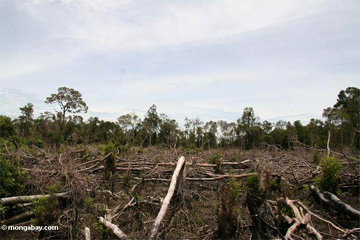 Orangutan habitat converted for an oil palm plantation in Kalimantan, Indonesian Borneo. |
Plus, if we want to save orangutans, we have to evolve morally as a species, another huge task. I’m not sure we are advanced enough morally as a species to save another species. It can’t just be a few dedicated souls. It has to be an act of the mass of humanity. We have to change our basic attitude on the planet. And that’s a huge task. Ultimately we can’t legislate the survival of a species or force it on own species. Our species has to find the will and desire in itself.
Meanwhile, orangutans plunge onward toward extinction. That’s disheartening
Mongabay: Is the situation with orangutans discouraging? Are there hopeful developments?
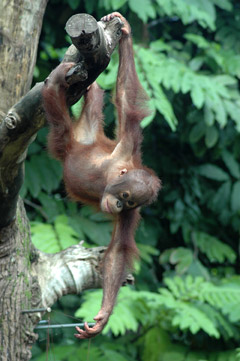 Photo by Shawn Thompson. |
Shawn Thompson: I knew it was pretty hopeless for orangutans when I started the book. It doesn’t get better, but you feel encouraged being with people who have a fighting spirit. If you have to spend your last hours on the planet with anyone, that’s the kind of people you want to be with – at least for me. It is thrilling to be around a Willie Smits or a Lone Droscher-Nielsen. I often asked the people working with orangutans why they were so committed to such a quixotic task. It didn’t seem to deter them. They are that kind of people. And I am that way too. I think that orangutans are doomed but that you should still work your darnedest to save them, no matter what. That’s the message I got from Ian Singleton in Sumatra when we talked about it. I think that’s the idealistic streak in me and in the people I talked to as well. I must be some kind of a cynical optimistic, if there is such a thing.
I think the human spirit of the people who care about orangutans is wonderful and, even if it is a long shot, I am cheering them on and I hope that comes across in the book. I didn’t think a gloomy message would do any good, but I also didn’t think the message should hide the critical situation. I hope the book catches the spirit of those fighting for orangutans and giving orangutans the best chance to survive against depressing odds. I guess I want to live in a bit of an idealistic world where we have a chance of saving orangutans despite the terrible reality of the situation.
Mongabay: How do we address the situation and take political and environmental action?
Shawn Thompson: I think it’s important to be practical about how we apply influence and where we apply it to take political and environmental action. I don’t think the salvation of orangutans and the rain forest will ultimately come from the West. Activists and consumers in the West are still crucial and we still need the initiatives, such as clear labeling of products using palm oil, the sustainability certification process of organizations like the Rainforest Alliance and land conservation in Borneo and Sumatra coming from organizations like the Orangutan Conservancy and the Orangutan Land Trust. We need to encourage producers to use sustainable practices by buying their products instead of just attacking and punishing the offenders. We want to use positive reinforcement as consumers. Positive initiatives from the West are important, as is diplomacy from the West.
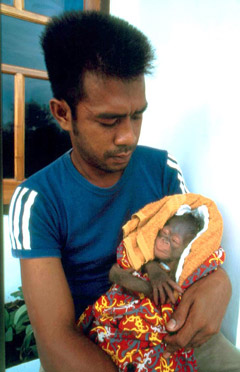 Young orangutan. Photo by Shawn Thompson. |
But I think that salvation for orangutans has to come from the East, from Indonesia, which in spite of fighting a bitter colonial war against the Dutch still respects westerners, if not always western politicians. So, in the West, we need to support and help nurture a made-in-Indonesia solution, with an eye on consumerism in India and China as a huge market for products from Indonesia that are affecting the rain forest. And I suspect that will come from women in Indonesia, especially the new generation of young women, as it is in other parts of the world, in the West too. It will come out of the deep values of women and their sensibility, although we men will also help. I got a sense of conviction about this last summer as I traveled through Indonesia talking to politicians and activists there.
I think it is typical of the situation that my book will probably strike a chord with women between the ages of 15 and 25 and women in their 50s like me. I will do my male best by writing a book and trying to inspire people, but it is my girlfriend Wendy and women like her who will save orangutans. Look at Lone Droscher-Nielsen and Michelle Desilets and so on. Even on Facebook I notice that I am connecting more with women than men on this issue and I notice how the women speak a different language about orangutans than men, although men like my friend Gary Shapiro stand out and I find it thrilling to listen to Gary talk about his “adopted daughter” the orangutan Princess, who he taught sign language in the jungle in the late 1970s. Gary is fearless in getting sentimental about orangutans and yet he has an empirical streak that I don’t quite understand. I don’t get how he integrates those elements, but he does and functions well in a crazy world. But then he is also married to an Indonesian woman, Inggriani, so maybe that explains it.
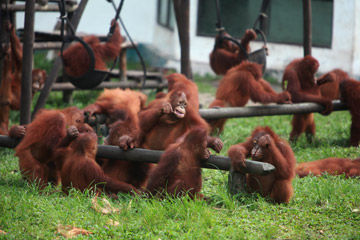 Dozens of orphaned orangutan at the Borneo Orangutan Society’s facility in Central Kalimantan. Photo by Rhett Butler. |
Lone Droscher-Nielsen in particular is someone we want to watch. I think she has the potential to emerge as an important global leader in the fight for orangutans, if she doesn’t burn out first and bear the weight too much of endless individual orangutans needing endless help and shrinking forests and the desperate need to raise funds. I wish she could fight the fight without having to worry about funding. Lone needs our support. I’d like to write a biography of Lone, which the world needs, but I don’t think she is ready for that yet. I think women in the West need to support women in the East. That would be a powerful alliance to save orangutans and the rain forest. That might work. Those women need to connect and get organized together.
I didn’t get this political in my book. I didn’t write a political book about orangutans because I thought we needed to win a large, mainstream audience for orangutans first. I thought that should be my role as a writer, although now that the book is written I’d like to be more vocal about want needs to be done, if that will help.
Mongabay: Why are orangutans so special for you?
Shawn Thompson: I think I empathize more with orangutans than gorillas and chimpanzees because I understand better their solitary, introspective side, unlike the more social gorillas and chimpanzees. You need a solitary, intuitive side to be a strong writer, which creates a clash with other things you need to be a writer. With orangutans – who would make good writers, by the way – I like their quiet, thoughtful, feeling nature. If you use your eyes in a gentle way, you feel like you are having a conversation with them. If you slow down and enjoy the sensuality and joy of the natural world, you feel like you are in touch with them. That’s not scientific, of course, but then orangutans aren’t studying science. They don’t have to justify themselves that way. They are living in the world we think we have to study. I also like the people who like orangutans and they made orangutans special for me. They were my guides, my gurus.
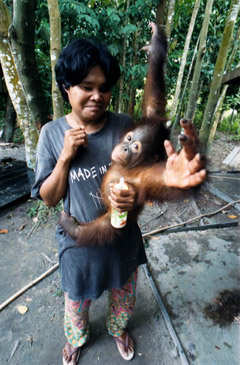 Infant orangutan. Photo by Shawn Thompson. |
I started to notice the intimacy that a few privileged people had with orangutans and I liked that sense of an intimate relationship you could have with a member of another species. I really got that watching Willie Smits and Lone Droscher-Nielsen with young orphan orangutans at the Nyaru Menteng facility in Kalimantan, Borneo, and the vet Rosa Garriga in Pasir Pajang. There was a very special moment for me when Willie took my son Pearce and me at night into a dormitory for young orangutans and we watched them sleeping. I saw how much that moved Willie and it moved me too. It was a combination of watching Willie being moved and feeling moved myself and watching orangutans asleep. There is a real sweetness and tenderness in being allowed into that protected space of another living, sentient being asleep and lost in dreams. I have that with my girlfriend Wendy too. I also enjoyed sleeping on the deck of a boat on a river in the jungle and feeling that I was under the stars of orangutans and breathing the air of their trees and the fresh plumes of their stardust. My son was with me then too.
It is not just about experiencing orangutans. It is about sharing the experience, like Willie did with me, like I did with my son, like I hope to do with others with my book. I meant the word “intimate” in the title of the book on many different levels.
Mongabay: What’s next for you?

|
Shawn Thompson: I want to continue writing about wild animals. Before the orangutan book, I wrote a book about federal prisoners in Canada and the United States, from my time as a prison reporter. And before that I wrote a travel guide. I’d love to write another book about the great apes, but there are too many people better equipped to write about gorillas, chimpanzees and bonobos than me. I was all set a couple of years to head off to the Congo to write about bonobos, but the funding from my university fell through at the last minute, and a lot of it is about having the time and funding to write these books. The publishers can’t finance them. But, if my orangutan book catches on, then I will have a mandate to continue to write about wild animals and their problems, and that is such a satisfying mission to have. I can live with that mission.
The Intimate Ape: Orangutans and the Secret Life of a Vanishing Species
Shawn Thompson divides his time between Seattle, Washington State and Kamloops, British Columbia. His website is a-new-leaf.com and he can be found on Facebook with intimateape (at) hotmail . com
Related articles
Orangutans vs palm oil in Malaysia: setting the record straight

(01/16/2010) The Malaysian palm oil industry has been broadly accused of contributing to the dramatic decline in orangutan populations in Sabah, a state in northern Borneo, over the past 30 years. The industry has staunchly denied these charges and responded with marketing campaigns claiming the opposite: that oil palm plantations can support and nourish the great red apes. The issue came to a head last October at the Orangutan Colloquium held in Kota Kinabalu. There, confronted by orangutan biologists, the palm oil industry pledged to support restoring forest corridors along rivers in order to help facilitate movement of orangutans between remaining forest reserves across seas of oil palm plantations. Attending NGOs agreed that they would need to work with industry to find a balance that would allow the ongoing survival of orangutans in the wild. Nevertheless the conference was still marked by much of the same rhetoric that has characterized most of these meetings — chief palm oil industry officials again made dubious claims about the environmental stewardship of the industry. However this time there was at least acknowledgment that palm oil needs to play an active role in conservation.
Palm oil both a leading threat to orangutans and a key source of jobs in Sumatra
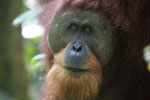
(09/24/2009) Of the world’s two species of orangutan, a great ape that shares 96 percent of man’s genetic makeup, the Sumatran orangutan is considerably more endangered than its cousin in Borneo. Today there are believed to be fewer than 7,000 Sumatran orangutans in the wild, a consequence of the wildlife trade, hunting, and accelerating destruction of their native forest habitat by loggers, small-scale farmers, and agribusiness. Gunung Leuser National Park in North Sumatra is one of the last strongholds for the species, serving as a refuge among paper pulp concessions and rubber and oil palm plantations. While orangutans are relatively well protected in areas around tourist centers, they are affected by poorly regulated interactions with tourists, which have increased the risk of disease and resulted in high mortality rates among infants near tourist centers like Bukit Lawang. Further, orangutans that range outside the park or live in remote areas or on its margins face conflicts with developers, including loggers, who may or may not know about the existence of the park, and plantation workers, who may kill any orangutans they encounter in the fields. Working to improve the fate of orangutans that find their way into plantations and unprotected community areas is the Orangutan Information Center (OIC), a local NGO that collaborates with the Sumatran Orangutan Society (SOS).
Rehabilitation not enough to solve orangutan crisis in Indonesia
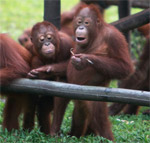
(08/20/2009) A baby orangutan ambles across the grass at the Borneo Orangutan Survival Foundation’s Nyaru Menteng rehabilitation center in Central Kalimantan, in the heart of Indonesian Borneo. The ape pauses, picks up a stick and makes his way over to a plastic log, lined with small holes. Breaking the stick in two, he pokes one end into a hole in an effort to extract honey that has been deposited by a conservation worker. His expression shows the tool’s use has been fruitful. But he is not alone. To his right another orangutan has turned half a coconut shell into a helmet, two others wrestle on the lawn, and another youngster scales a papaya tree. There are dozens of orangutans, all of which are about the same age. Just outside the compound, dozens of younger orangutans are getting climbing lessons from the Borneo Orangutan Survival Foundation (BOS) staff, while still younger orangutans are being fed milk from bottles in a nearby nursery. Still more orangutans—teenagers and adults—can be found on “Orangutan Island” beyond the center’s main grounds. Meanwhile several recently wild orangutans sit in cages. This is a waiting game. BOS hopes to eventually release all of these orangutans back into their natural habitat—the majestic rainforests and swampy peatlands of Central Kalimantan, on the island of Borneo. But for many, this is a fate that may never be realized.
Orangutan guerrillas fight palm oil in Borneo
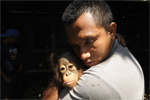
(06/01/2009) Despite worldwide attention and concern, prime orangutan habitat across Sumatra and Borneo continues to be destroyed by loggers and palm oil developers, resulting in the death of up to 3,000 orangutans per year (of a population less than 50,000). Conservation groups like Borneo Orangutan Survival report rescuing record numbers of infant orangutans from oil palm plantations, which are now a far bigger source of orphaned orangutans than the illicit pet trade. The volume of orangutans entering care centers is such that these facilities are running out of room for rescued apes, with translocated individuals sometimes waiting several months until suitable forest is found for reintroduction. Even then they aren’t safe; in recent months loggers have started clearing two important reintroduction sites (forests near Bukit Tigapuluh National Park in Sumatra and Mawas in Central Kalimantan). Meanwhile across half a dozen rehabilitation centers in Malaysia and Indonesia, more than 1,000 baby orangutans—their mothers killed by oil palm plantation workers or in the process of forest clearing—are being trained by humans for hopeful reintroduction into the wild, assuming secure habitat can be found. Dismayed by the rising orangutan toll, a grassroots organization in Central Kalimantan is fighting back. Led by Hardi Baktiantoro, the Center for Orangutan Protection (COP) has mounted a guerrilla-style campaign against companies that are destroying orangutan habitat in Kalimantan, the Indonesian part of Borneo.
(05/24/2006) A look at conservation efforts in Kalimantan, on the island of Borneo. I’m in Tanjung Puting National Park in southern Kalimantan on the island of Borneo. At 400,000 hectares (988,000 acres) Tanjung Puting is the largest protected expanse of coastal tropical heath and peat swamp forest in southeast Asia. It’s also one of the biggest remaining habitats for the critically endangered orangutan, the population of which has been great diminished in recent years due to habitat destruction and poaching. And orangutans have become the focus of a much wider effort to save Borneo’s natural environment. We are headed to Campy Leakey, named for the renowned Kenyan paleontologist Louis Leakey. Here lies the center of the Orangutan Research conservation Project. Established by Birute Mary Galdikas, a preeminent primatologist and founder of the Orangutan Foundation International (OFI), the project seeks to support the conservation and understanding of the orangutan and its rain forest habitat while rehabilitating ex-captive individuals. The Orangutan Research conservation Project is the public face of orangutan conservation in this part of Kalimantan, the Indonesia-controlled part of Borneo. Borneo, the third largest island in the world, was once home to some of the world’s most majestic, and forbidding forests. With swampy coastal areas fringed by mangrove forests and a mountainous interior, much of the terrain was virtually impassable and unexplored. Headhunters ruled the remote parts of the island until a century ago.







